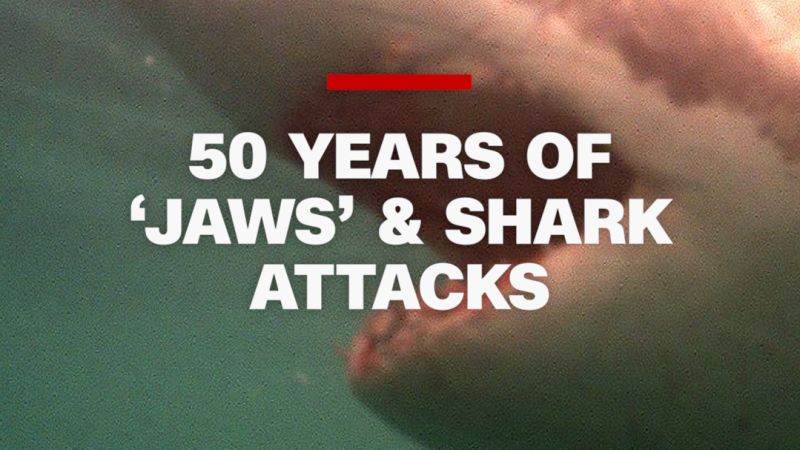The Legacy Of Jaws: Examining Shark Attacks Then And Now

Welcome to your ultimate source for breaking news, trending updates, and in-depth stories from around the world. Whether it's politics, technology, entertainment, sports, or lifestyle, we bring you real-time updates that keep you informed and ahead of the curve.
Our team works tirelessly to ensure you never miss a moment. From the latest developments in global events to the most talked-about topics on social media, our news platform is designed to deliver accurate and timely information, all in one place.
Stay in the know and join thousands of readers who trust us for reliable, up-to-date content. Explore our expertly curated articles and dive deeper into the stories that matter to you. Visit Best Website now and be part of the conversation. Don't miss out on the headlines that shape our world!
Table of Contents
The Legacy of Jaws: Examining Shark Attacks Then and Now
The summer of 1975 saw the release of Steven Spielberg's Jaws, a cinematic masterpiece that terrified audiences worldwide and left an indelible mark on popular culture. But beyond the gripping narrative and iconic score, Jaws ignited a fervent, and often inaccurate, public discourse surrounding shark attacks. This article examines the legacy of Jaws, exploring how the film impacted our perception of sharks and how the reality of shark attacks compares then and now.
The Jaws Effect: Fear and Misinformation
Jaws undeniably fueled a widespread fear of sharks. Suddenly, seemingly innocuous beaches became potential arenas of terrifying encounters. This fear, while fictionalized, led to significant consequences. Many coastal communities witnessed a dramatic drop in tourism, impacting local economies. Furthermore, the film's portrayal of great white sharks as relentless, man-eating machines spurred a wave of indiscriminate shark culls. Millions of sharks were killed, many unnecessarily, based on fear rather than factual understanding. This indiscriminate killing had a devastating impact on already fragile shark populations, highlighting the dangerous consequences of misinformation.
Shark Attacks: Then and Now – A Statistical Look
While Jaws dramatically amplified the perceived threat of shark attacks, the actual statistics tell a different story. Although precise historical data is challenging to compile, studies suggest that the number of shark attacks remains relatively consistent over the past decades, despite fluctuating year-to-year. Organizations like the International Shark Attack File (ISAF) meticulously track shark attacks globally, providing valuable data for researchers and the public. Their data reveals that fatal attacks remain exceedingly rare, significantly lower than risks associated with other common activities like driving or swimming in pools. [Link to ISAF website]
Understanding the Reality: Why Do Shark Attacks Happen?
Shark attacks, while infrequent, are often attributed to several factors: mistaken identity (sharks might confuse humans with their natural prey), territorial defense, or accidental encounters. Most attacks involve smaller shark species, not the great white shark famously portrayed in Jaws. Understanding these factors is crucial to mitigating risk and promoting responsible ocean behavior. This includes avoiding swimming at dawn or dusk (when sharks are most active), avoiding areas known for shark aggregations, and refraining from swimming with open wounds.
Beyond the Fear: Conservation and Coexistence
The legacy of Jaws is a complex one. While the film sparked unwarranted fear and led to harmful actions, it also inadvertently brought sharks into the global spotlight. This heightened awareness, albeit initially negative, has paved the way for increased conservation efforts and a growing understanding of these vital marine creatures. Today, many organizations are working tirelessly to protect sharks from overfishing and habitat destruction – threats far more significant than the rare possibility of an attack. [Link to a relevant conservation organization]
Moving Forward: Responsible Ocean Stewardship
The story of Jaws serves as a reminder of the power of media to shape public perception. While fear is a powerful motivator, it should be based on facts and scientific understanding, not sensationalized fiction. Moving forward, fostering responsible ocean stewardship requires a balanced approach: respecting the power and importance of sharks while promoting safe practices for both humans and these magnificent creatures. Educating the public about the reality of shark attacks, their crucial role in the marine ecosystem, and the ongoing threats to their survival is crucial for ensuring their future and the health of our oceans.
Call to Action: Learn more about shark conservation and responsible ocean behavior by visiting [link to relevant resource]. Let’s ensure that future generations appreciate sharks not just for their cinematic presence, but for their vital role in maintaining a healthy planet.

Thank you for visiting our website, your trusted source for the latest updates and in-depth coverage on The Legacy Of Jaws: Examining Shark Attacks Then And Now. We're committed to keeping you informed with timely and accurate information to meet your curiosity and needs.
If you have any questions, suggestions, or feedback, we'd love to hear from you. Your insights are valuable to us and help us improve to serve you better. Feel free to reach out through our contact page.
Don't forget to bookmark our website and check back regularly for the latest headlines and trending topics. See you next time, and thank you for being part of our growing community!
Featured Posts
-
 Us War Threat Mlb Stars Public Declaration Against Trumps Presidency
Jun 22, 2025
Us War Threat Mlb Stars Public Declaration Against Trumps Presidency
Jun 22, 2025 -
 Controversy As Ice Re Ups Deal With Non Compliant Detention Facility
Jun 22, 2025
Controversy As Ice Re Ups Deal With Non Compliant Detention Facility
Jun 22, 2025 -
 Commons Votes To Advance Assisted Dying Bill Implications And Next Steps
Jun 22, 2025
Commons Votes To Advance Assisted Dying Bill Implications And Next Steps
Jun 22, 2025 -
 Radiation Fears Rise In Gulf As Qatar Monitors Increased Levels After Iranian Nuclear Site Attacks
Jun 22, 2025
Radiation Fears Rise In Gulf As Qatar Monitors Increased Levels After Iranian Nuclear Site Attacks
Jun 22, 2025 -
 No More Aggression Then Talks Irans Stance On Israeli Conflict
Jun 22, 2025
No More Aggression Then Talks Irans Stance On Israeli Conflict
Jun 22, 2025
Latest Posts
-
 Two Months Later Megan Fox And Mgk Finally Reveal Their Daughters Name
Jun 22, 2025
Two Months Later Megan Fox And Mgk Finally Reveal Their Daughters Name
Jun 22, 2025 -
 Megan Fox And Machine Gun Kellys Baby The Name Is Finally Here
Jun 22, 2025
Megan Fox And Machine Gun Kellys Baby The Name Is Finally Here
Jun 22, 2025 -
 Elite Israeli Casualties The High Cost Of Mossads Operation Bramble Bush In Iraq
Jun 22, 2025
Elite Israeli Casualties The High Cost Of Mossads Operation Bramble Bush In Iraq
Jun 22, 2025 -
 Tensions Boil Over Mlb Announces Suspensions In Dodgers Padres Series Finale
Jun 22, 2025
Tensions Boil Over Mlb Announces Suspensions In Dodgers Padres Series Finale
Jun 22, 2025 -
 Cameron Brinks White Dress A Graduation Fashion Highlight
Jun 22, 2025
Cameron Brinks White Dress A Graduation Fashion Highlight
Jun 22, 2025
